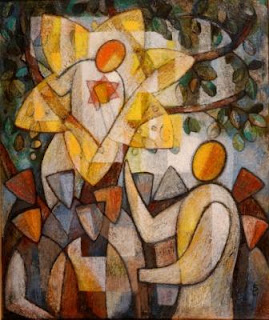October 31st, 2010
Luke 10:1-10
Now a man there named Zacchaeus, who was a chief tax collector and also a wealthy man, was seeking to see who Jesus was…
Wealthy persons rarely come up in the Gospels, but when they are mentioned they usually do not fair too well. This is particularly true of the Gospel according to St. Luke – we have already heard in recent weeks of the parable of the rich man and the poor Lazarus; how the rich man went to hell, since he did not help Lazarus when he was in need.
Just a few verses before today’s Gospel, there is the passage about the rich young man who desired to follow Christ – the Lord told him to sell all his possessions and give his wealth to the poor; but the rich man went away sad, for he was attached to his many possessions. It was on this occasion that Christ said, “It will be easier for a camel to pass through the eye of a needle, than for a rich man to enter heaven.” We may sum it all up with the Lord’s own words, “Woe to you who are rich.” Indeed, the rich will hardly be saved.
No, rich men do not usually do too well, when they meet Jesus; and this should be a bit alarming for most of us. Nearly every one of us would be considered rich in the Gospel sense of the word – we have our basic necessities provided for, and we have at least a few luxuries besides.
But St. Luke does not want us to be discouraged, and Jesus wants each and every one of us to know that he loves us. Thus, so that we might not feel dejected, St. Luke includes the account of the conversion of Zacchaeus – and we ought to note that this account is found only in Luke’s Gospel. He puts in there, I think, because he knows that he has been particularly hard on the rich and he doesn’t want us to give up hope.
In the story about Zacchaeus, the first thing we learn about the man, even before we learn that he is short (which is really a bit humorous), the first thing we learn is that he is a chief tax collector (and, thus, very powerful) and that he is wealthy. Before St. Luke tells us anything else, we learn that Zacchaeus is rich and powerful, and so we might be thinking to ourselves, “I know how this story is going to end, Zacchaeus is really going to get it.” But, behold, there is a new twist, something which is quite unexpected – Zacchaeus is not rejected by Christ, nor does he turn away from the Lord, but he is welcomed by our Savior and becomes his disciple.
When Jesus looks up in the tree and sees Zacchaeus, he calls to him and accepts him as a disciple – and we must point out that Zacchaeus was still rich at this time. The Lord called Zacchaeus while he was still rich, and Zacchaeus became a disciple while still wealthy. Here we find a great deal of encouragement – for Jesus looked at Zacchaeus and he did not see a rich man or a tax collector, he saw a son of Abraham, a poor lost sheep in need of a true shepherd. The gaze of our Savior pierces through all that is superficial and penetrates to the core. Perhaps for the first time in his life, someone loved and accepted Zacchaeus for who he was as a human being, rather than for his riches and his power.
So, up till now, we are all very much encouraged; for we know that Christ looks at each of us with that same gaze of love which fell upon Zacchaeus – but though Christ loves us as we are, he calls us forward to be something new; and this is a challenge to us. Zacchaeus is accepted by Christ as a rich man, and the Lord does not even command him to give his possessions to the poor – but Zacchaeus is compelled (not by word or deed, but by love itself) he is compelled to give half of his wealth to the poor. Because he loves Christ, Zacchaeus must also love the poor. The love of Christ, which so fills Zacchaeus, overflows in a love for the poor.
It is the same for us – Christ loves us and that love moves us not only to a true love for him, but also for an intense and even a sacrificial love for the poor. Because the love of Christ is pure, it is also purifying – and thus, the love of Christ compels us to love others even as he has loved us.
I am reminded of the words of Mother Teresa, “Jesus in the Eucharist, Jesus in the poor. It is the same Jesus.” Now Mother Teresa surely knew that Christ is not present in the poor in the same way in which he is present in the Eucharist. He is present in the Eucharist really, truly, substantially, and sacramentally. In the poor, though he is present really and truly, Christ is not present substantially and sacramentally. The mode of presence is clearly different, but the one who is present in the Blessed Sacrament and the one who is present in the poor is the same Jesus.
The Savior is so closely identified with the poor that he can truly say, “Whatever you do to the least of my brethren, you do it to me.”
May the love of Christ purify and fill us, and may our love for the poor here on earth bring us swiftly to the glories of life everlasting.
